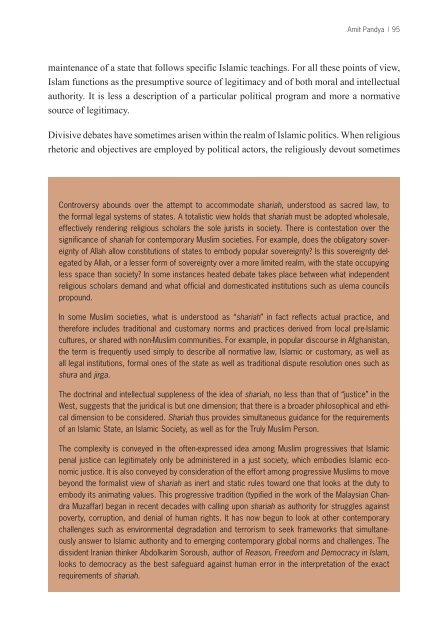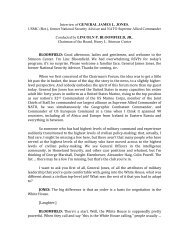Islam and Politics - The Stimson Center
Islam and Politics - The Stimson Center
Islam and Politics - The Stimson Center
Create successful ePaper yourself
Turn your PDF publications into a flip-book with our unique Google optimized e-Paper software.
Amit P<strong>and</strong>ya | 95<br />
maintenance of a state that follows specific <strong>Islam</strong>ic teachings. For all these points of view,<br />
<strong>Islam</strong> functions as the presumptive source of legitimacy <strong>and</strong> of both moral <strong>and</strong> intellectual<br />
authority. It is less a description of a particular political program <strong>and</strong> more a normative<br />
source of legitimacy.<br />
Divisive debates have sometimes arisen within the realm of <strong>Islam</strong>ic politics. When religious<br />
rhetoric <strong>and</strong> objectives are employed by political actors, the religiously devout sometimes<br />
Controversy abounds over the attempt to accommodate shariah, understood as sacred law, to<br />
the formal legal systems of states. A totalistic view holds that shariah must be adopted wholesale,<br />
effectively rendering religious scholars the sole jurists in society. <strong>The</strong>re is contestation over the<br />
significance of shariah for contemporary Muslim societies. For example, does the obligatory sovereignty<br />
of Allah allow constitutions of states to embody popular sovereignty? Is this sovereignty delegated<br />
by Allah, or a lesser form of sovereignty over a more limited realm, with the state occupying<br />
less space than society? In some instances heated debate takes place between what independent<br />
religious scholars dem<strong>and</strong> <strong>and</strong> what official <strong>and</strong> domesticated institutions such as ulema councils<br />
propound.<br />
In some Muslim societies, what is understood as “shariah” in fact reflects actual practice, <strong>and</strong><br />
therefore includes traditional <strong>and</strong> customary norms <strong>and</strong> practices derived from local pre-<strong>Islam</strong>ic<br />
cultures, or shared with non-Muslim communities. For example, in popular discourse in Afghanistan,<br />
the term is frequently used simply to describe all normative law, <strong>Islam</strong>ic or customary, as well as<br />
all legal institutions, formal ones of the state as well as traditional dispute resolution ones such as<br />
shura <strong>and</strong> jirga.<br />
<strong>The</strong> doctrinal <strong>and</strong> intellectual suppleness of the idea of shariah, no less than that of “justice” in the<br />
West, suggests that the juridical is but one dimension; that there is a broader philosophical <strong>and</strong> ethical<br />
dimension to be considered. Shariah thus provides simultaneous guidance for the requirements<br />
of an <strong>Islam</strong>ic State, an <strong>Islam</strong>ic Society, as well as for the Truly Muslim Person.<br />
<strong>The</strong> complexity is conveyed in the often-expressed idea among Muslim progressives that <strong>Islam</strong>ic<br />
penal justice can legitimately only be administered in a just society, which embodies <strong>Islam</strong>ic economic<br />
justice. It is also conveyed by consideration of the effort among progressive Muslims to move<br />
beyond the formalist view of shariah as inert <strong>and</strong> static rules toward one that looks at the duty to<br />
embody its animating values. This progressive tradition (typified in the work of the Malaysian Ch<strong>and</strong>ra<br />
Muzaffar) began in recent decades with calling upon shariah as authority for struggles against<br />
poverty, corruption, <strong>and</strong> denial of human rights. It has now begun to look at other contemporary<br />
challenges such as environmental degradation <strong>and</strong> terrorism to seek frameworks that simultaneously<br />
answer to <strong>Islam</strong>ic authority <strong>and</strong> to emerging contemporary global norms <strong>and</strong> challenges. <strong>The</strong><br />
dissident Iranian thinker Abdolkarim Soroush, author of Reason, Freedom <strong>and</strong> Democracy in <strong>Islam</strong>,<br />
looks to democracy as the best safeguard against human error in the interpretation of the exact<br />
requirements of shariah.

















